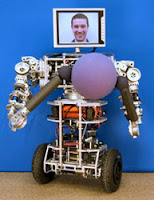Imagine a world where you have a faithful aide by your side that can assist you with just about anything from moping up the floors, washing the dishes, patrolling your house, providing elder care to being you best buddy by being ready to help whenever you need it. It seems that after the dog, robots are going to be man's most faithful friend.
We seem to have come far from the times when robots or mechanical servants were only heard of in ancient mythologies, such as the robots built by the Greek god Hephaestus to the age of patient aid and assistive devices. While, modern robotics has come a long way, there was a lot of buzz recently about the “uBOT-5” - the robot, supposed to be an awesome robotic assistant for the elderly in future.
The State-of-the-art Robotics
And it's not without a reason because computer science researchers are well set on their path to endow these “mechanical servants” with never seen capabilities. For instance the uBOT-5 would not only be able them to assist the elderly but would also act to help them, e.g. dialing 911 in case of emergencies. Or they could send out reminders to patients when its time for their medication. To top it all, they could even help them with grocery shopping in addition to allow them to talk to their friends 'n' family including healthcare providers.
would also act to help them, e.g. dialing 911 in case of emergencies. Or they could send out reminders to patients when its time for their medication. To top it all, they could even help them with grocery shopping in addition to allow them to talk to their friends 'n' family including healthcare providers.
However, this is only one side of the story, because when a patient's friends, family or medics need to talk to their loved ones – they too can initiate a conversation via the assistant. For instance, a concerned family member who wants to know about whether their elderly relative is ok or not? They can establish a link with any Internet connection, or better still navigate around the house to look for mom or dad. This can be especially useful if a patient needs help and is unable to take the call.
At the same time, while the technology may have advanced, cost concerns still seem to persist for these patient aids. For instance, at present the prototypes at University of Massachusetts Amherst cost close to $65,000 for a unit. However, experts believe that with commercialization the robots may cost about $5,000. That's less, but lesser still would be be better.
Till the time that happens, perhaps cutting edge enhancements to the already existing patient aid equipments aren't bad either – as some interesting gadgets came to life at this year's Assistive Technology Exposition of the Saint Francis University’s CERMUSA - including retina-steered wheelchairs, digitized and synthesized speech-generating devices and pressure sensing prosthetic limbs that could fill up a glass or water or wine!
Possibly interesting posts:

We seem to have come far from the times when robots or mechanical servants were only heard of in ancient mythologies, such as the robots built by the Greek god Hephaestus to the age of patient aid and assistive devices. While, modern robotics has come a long way, there was a lot of buzz recently about the “uBOT-5” - the robot, supposed to be an awesome robotic assistant for the elderly in future.
The State-of-the-art Robotics
And it's not without a reason because computer science researchers are well set on their path to endow these “mechanical servants” with never seen capabilities. For instance the uBOT-5 would not only be able them to assist the elderly but
 would also act to help them, e.g. dialing 911 in case of emergencies. Or they could send out reminders to patients when its time for their medication. To top it all, they could even help them with grocery shopping in addition to allow them to talk to their friends 'n' family including healthcare providers.
would also act to help them, e.g. dialing 911 in case of emergencies. Or they could send out reminders to patients when its time for their medication. To top it all, they could even help them with grocery shopping in addition to allow them to talk to their friends 'n' family including healthcare providers.However, this is only one side of the story, because when a patient's friends, family or medics need to talk to their loved ones – they too can initiate a conversation via the assistant. For instance, a concerned family member who wants to know about whether their elderly relative is ok or not? They can establish a link with any Internet connection, or better still navigate around the house to look for mom or dad. This can be especially useful if a patient needs help and is unable to take the call.
At the same time, while the technology may have advanced, cost concerns still seem to persist for these patient aids. For instance, at present the prototypes at University of Massachusetts Amherst cost close to $65,000 for a unit. However, experts believe that with commercialization the robots may cost about $5,000. That's less, but lesser still would be be better.
Till the time that happens, perhaps cutting edge enhancements to the already existing patient aid equipments aren't bad either – as some interesting gadgets came to life at this year's Assistive Technology Exposition of the Saint Francis University’s CERMUSA - including retina-steered wheelchairs, digitized and synthesized speech-generating devices and pressure sensing prosthetic limbs that could fill up a glass or water or wine!
Possibly interesting posts:





No comments:
Post a Comment